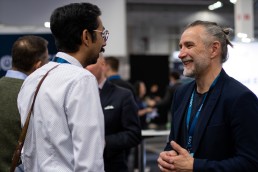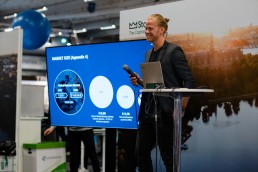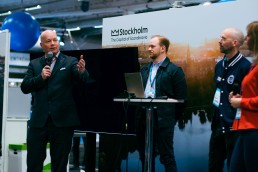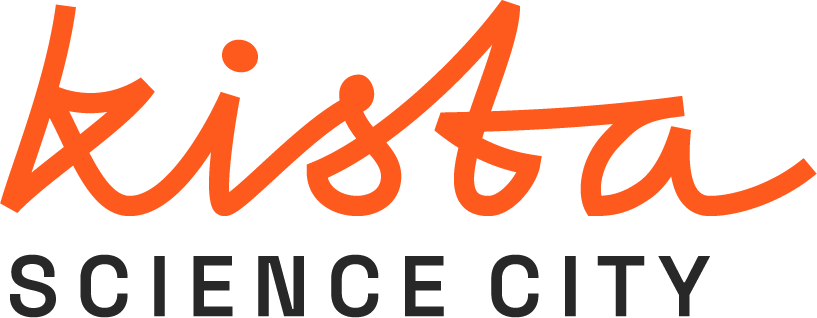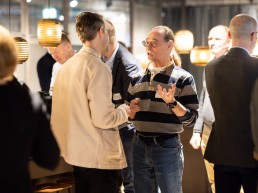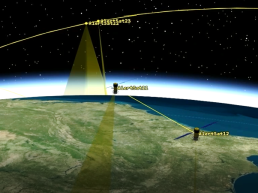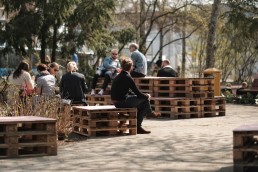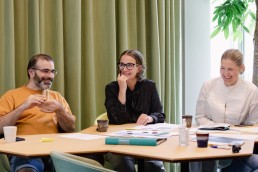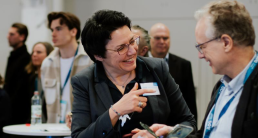Space tech companies are clustering in Kista
Mention the concept of space technology, and interplanetary tourism or moon-based cities may be the first things that spring to mind. But much of contemporary operations in space tech, globally, are focused on observing and monitoring our own planet. Smaller-sized electronic and optronic components have made space tech less expensive, and with edge computing capabilities, massive amounts of earth data, gathered via satellites, can even be processed in orbit.
Kista is home to a number of start-ups and well-established businesses developing solutions for space-based communications and satellite components. In November 2022, OHB Sweden, a former subsidiary of Swedish Space Corporation, and one of the larger players in Kista’s space tech cluster, successfully launched the satellite MATS (Mesospheric Airglow/Aerosol Tomography and Spectroscopy), which is going to measure atmospheric waves and study their impact on the earth’s climate. While MATS is a research satellite, the really big change in space tech is the move toward commercial offerings.
New constellations in rocket science
Satellite-based earth observation is already used in a multitude of applications and business opportunities are growing. One of the space tech start-ups in Kista taking advantage of this shift on the global market towards commercial space-based services is PandionAI. They moved to Kista from Uppsala some 18 months ago. Christer Andersson, one of the company’s co-founders, explains that being a small company—they are three full-time employees—having an office located near other companies in the same field is definitely a benefit to their business.
– A lot of research goes into the development of our satellite constellation and our alert service, of course, says Christer Andersson. We have funding from ESA Business Incubation Centre, Swedish National Space Agency, the ESA Artes BASS program and Vinnova, but R&D resources are scarce. Having our office close to KTH Space Centre here in Kista means that we have been lucky enough to have a number of KTH space tech students and researchers working with us to complete our mission.
– Our concept, explains Christer Andersson, is offering AI-based image interpretations of the earth’s surface, and our customers can subscribe to the data they need for a specific geographic area. Our satellite constellation, AlertSat, will be launched incrementally from late 2025 and onwards. It will provide a global surveillance system, based on small earth-observing satellites, which will provide end users with timely and accurate information that they can use to act on. This information, called Alerts, is based on the changes that satellites detect in orbit from the image data they receive.
– We will launch our own satellite constellation for AlertSat, and I believe that so far, we are the only commercial company in Sweden to have this approach. We will not be building all parts of the satellites ourselves, though, and that is another reason for why we need to work closely together with other companies, with other areas of space tech expertise. Small companies are often experts at one particular aspect of the technology needed, and we will all benefit from helping each other move forward, Christer Andersson concludes.
On a mission to collect space garbage
Many current services relying on satellite information are used for monitoring the health of the earth’s environment. But, with an increasing number of years of human activity in space, even space itself, close to the earth, is starting to be affected by our debris. So much so, that a mission called ClearSpace was founded in 2018, in an attempt to remove debris orbiting the earth, introducing a sustainable approach to space activities. OHB Sweden is part of this initiative, contributing the design of a propulsion system for a satellite which will help remove objects left in orbit.
For many years, equipment has been launched into space with no requirements on how to dispose of these objects as they become obsolete or worn out. The result is that around 36,000 pieces of space garbage are now orbiting the earth, according to ESA—and that is not counting the really small pieces of space tech trash, threatening to crash into spaces vessels in use and damage them.
The demand for services based on satellites supporting sustainability and environmental monitoring is clearly presenting new business opportunities, and as space litter is becoming an increasing problem, those opportunities are likely to expand into space.
Exploring data privacy challenges for safer public spaces
Kista Science City, the Swedish Authority for Privacy Protection (IMY), the City of Stockholm, and the strategic innovation programme IoT Sweden (IoT Sverige) are launching a unique collaboration for regulatory testing. This is the second pilot in IMY’s regulatory lab. It will explore data privacy issues when gathering essential information needed to enhance safety in public spaces.
ENSURING SAFETY AND ELEVATING NEW MARKETS
The City of Stockholm’conduct comprehensive safety assessments, recognizing that true safety lies in how people perceive and experience their surroundings.
To enable both new innovative use cases, standardisation and large-scale use of data that can be used to measure and impact safety, we are exploring cutting-edge measurement methods using sensors and a privacy-by-design approach.
Vanessa Ware, Project Manager at Kista Science City, emphasizes the significance of early exploration of regulatory issues. “By proactively investigating regulatory grey areas, we create greater predictability for innovative companies and urban developers seeking to develop and adopt new solutions that safeguard the integrity,” Vanessa explains.
IMY’S GUIDANCE IN DATA PRIVACY
The collaboration will enable IMY to offer valuable guidance to both the city and businesses navigating the complex landscape of data privacy in use cases linked to urban safety. This approach offers not only guidance for new businesses and municipalities, but will also feedback valuable learnings on new technology to IMY’s innovation hub.
“By incorporating data protection considerations early on, through regulatory testing, we can offer guidance to many at the same time as we learn about new technologies. ” Karin Lönnheden, IMY
IMPACT AND NATIONWIDE VALUE
Addressing safety in public spaces is a critical concern for municipalities across Sweden and the learnings from this work will be shared wiht a larger group and expect to generate nationwide value. IoT Sverige and Kista Science City have worked closely in creating this partnership with IMY and the City of Stockholm.
Success for new cybersecurity programme
Last week, a selected group of medtech scale-ups actively participated in the final workshop and graduated from our cybersecurity programme. They have acquired enhanced awareness, competence, and strategic capabilities to seamlessly integrate cybersecurity into their products and business models, ensuring competitiveness and future sustainable growth in an increasingly cyber-threatened business environment.
“We have been able to incorporate lessons learned into our business right away”
Our participants are now equipped with practical insights and tools gained from the programme, enabling them to immediately apply valuable lessons in their day-to-day work and strategic decision-making processes. Their feedback has been overwhelmingly positive, highlighting the tangible tips and tools that can immediately be included in day to day business, as well as in more strategic decisions.
Throughout the programme, our scale-ups actively engaged with and learned from some of the most prominent experts in the field, including Marianne Rilde Björkman, My Söderström Bergdahl from Teknikföretagen, and Jan-Olof (JOA) Andersson. To conclude their journey, they took part in an cyberattack role play organized by Professor Stewart Kowalski, putting their newfound knowledge into action.
Read more about the programme and also about the industry day in corporation with Swedish Medtech.
The programme is set to continue in the fall, and we welcome additional scale-ups to join. For further information, feel free to reach out to Richard . Stay tuned for updates on upcoming programmes and future collaborations.
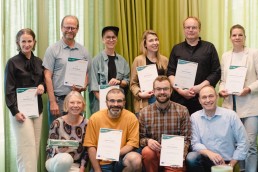
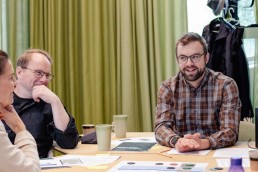
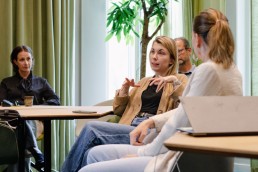
Clean Energy Summit
Last week, DeepTech Alliance organized the “Clean Energy Summit 2023” – an engaging event that explored the diverse domain of clean energy innovations and opportunities.
The summit underscored how clean energy is transforming urban mobility and introduced a variety of compelling new possibilities – with sustainability as the core driving force.
Participants engaged in peer-to-peer learnings and wide-ranging discussions, from investment dynamics in clean energy to the role of startups in accelerating the transition to sustainable energy solutions.
It’s great to be part of such a vibrant community, have access to insightful events, connect with innovative companies and industry leaders, and contribute to the progressive journey towards a sustainable future.
A big thank you to our colleagues at THINGS AB and DeepTech Alliance for the great collaboration!
Keen to be at the heart of sustainable innovation? Reach out to us!
New business opportunities above the clouds
Together with Cassini matchmaking, we recently hosted the Cassini Space event “Exploring the EUSpace ecosystem”, showcasing the top EU space startups and scaleups from Sweden and Europe, as well as local space and non-space companies. The event highlighted the rapidly expanding field of space technology and the numerous opportunities it presents.
During half a day, we provided a dynamic platform for startups to showcase their innovative ideas, alongside presentations from leading space companies exploring the industry’s latest trends.
Tomas Jonsson, from the EU DGDEFIS (European Commission Defence Industry and Space) , shared insights into the European space ecosystem, a panel discussion on new business opportunities in the space industry, featured experts such as William Johansson, from the Swedish Space Corporation, Ted Elvhage from Rymdkapital, and Hannes Eder, from KTH Innovation. Finally, Fredrik Sjöberg shared OHB Swedens’ experience of the growing market of space. “We have been building satellites for a long time and have the competence. Now we also need to find new colleagues as the market expands”, Fredrik explained.
Engaging pitches from startups as: HyImpulse, Ntention, ReOrbit, SuperAnnotate, Forsway, Ecaps AB, Neutron Star Systems, Vimotek AB, AcTLAbS, Dreamwaves, Pythom Space and Hybrid-Airplane Technologies GmbH demonstrated a wide range of creative ideas emerging in the industry.
Another highlight of the day was the matchmaking session, offering opportunities for one-on-one meetings between startups, corporates, and investors, laying the foundation for new partnerships shaping the future of space tech.
Karin Bengtsson, CEO of Kista Science City expressed her enthusiasm saying, “We are thrilled to witness the energy and passion from this vibrant space tech cluster in Kista, and fully committed to continuously support the growth of this innovative sector in our community. Through events like Cassini matchmaking, we actively enable new collaborations and partnerships, driving the advancement of future tech and laying the ground for a tomorrow that is sustainable and filled with possibilities.”
The event was a joint effort between Kista Science City, CASSINI Matchmaking, and the City of Stockholm. CASSINI Matchmaking is an initiative by the European Commission aimed at accelerating the growth of the European space industry.
